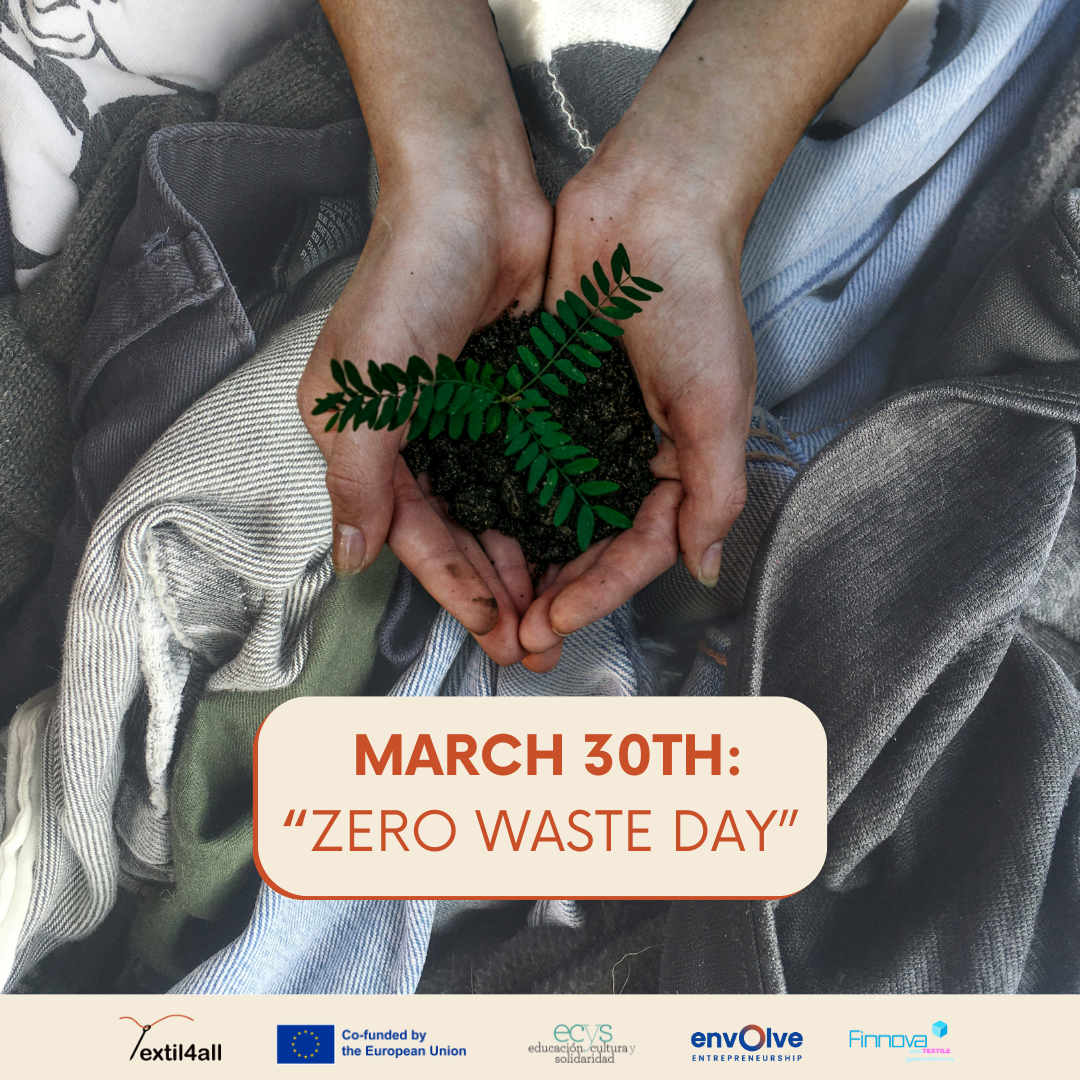- Humanity’s unsustainable production and consumption practices are driving the planet towards destruction.
- Improving collection, recycling and other forms of sound waste management remain an urgent priority.
- Textil4all promotes a more sustainable textile industry, committed to the current environmental challenges, facing their negative consequences.
On 14 December 2022, the United Nations General Assembly defined this date to proclaim 30 March as International Day of Zero Waste, to be observed annually. A date aimed at raising awareness of national, subnational, regional and local zero-waste initiatives and their contribution to achieving sustainable development.
The textile sector is relevant regarding this date. According to the estimations, textile production, through dyes and finishing products, is responsible for about 20 % of global drinking water pollution.
The way of consumption within the textile sector has changed, in fact, one of the most frequently occurring situations is the discarding of used textile garments, where people dispose of clothes, they will no longer wear by throwing them away, instead of donating or repairing them. In fact, less than half of used clothing is collected for reuse or recycling, and only 1% is recycled into new clothing.
We must understand that improving collection, recycling and other forms of sound waste management remains an urgent priority for the health of our planet.
But to solve the waste crisis, humanity must treat waste as a resource. This entails reducing waste generation and following the lifecycle approach. Resources should be reused or recovered as much as possible, and products should be designed to be durable and require fewer and low-impact materials. Upstream solutions like these can minimize pollution of air, land, and water and decrease the extraction of precious and limited natural resources. Achieving zero-waste societies requires action at all levels from all stakeholders.
Consumers can change consumption habits and reuse and repair products as much as possible before properly disposing of them. Governments, communities, industries and other stakeholders must improve financing and policymaking, especially as the waste crisis disproportionately impacts the marginalized, urban poor, women and youth.
Inger Andersen, the UNEP Executive Director states in the following video: “Zero waste makes sense on every level. Keeping materials in the economy and bolstering waste management will lead to enormous financial savings. Prevent greenhouse gas emissions. Avoid damage to the nature that sustains us. And reduce ill health and deaths. On International Day of Zero Waste, let us remember: nature doesn’t waste. Nor should we.”
A quote which leds to a reflection on our habits of consumption and waste generation, should we take a step back and rethink on how we act on our daily lives, and which small changes could we implement for us to take care of the planet we live in.
Textil4all bets and promotes objectives aligned to the values of improving the current conditions in the textile sector, promoting a more sustainable textile ecosystem and committed to the current environmental challenges, facing their negative consequences.
From textil4all we are focused on contributing to this change by promoting a more sustainable textile industry and promoting the green economy. We are committed to the current environmental challenges, achieving a Triple Impact: Environmental – social – economic. That is the main reason why we provide specific training to implement actions that contribute to the «ZeroWaste» and «Leave No One Behind».
Textil4all is part of the European Erasmus+ programme funded by SEPIE-Spanish Service for the Internationalisation of Education with a budget of 60,000 euros and a duration of 19 months. Led by Educación, cultura y solidaridad (Spain), the project counts with Envolve (Greece) and Finnova Foundation (Belgium) as partners.
Join us in this mission to make the textile sector an engine for positive change!
About Educación Cultura y Solidaridad (ECyS)
Educación Cultura y Solidaridad is a non-profit association whose mission is to promote the integral development of people so that they can be protagonists of their own history and collaborate in the construction of social problems, promoting participation and local development for a fairer world and an inclusive society. To this end, it carries out actions of socio-educational intervention with people and groups with greater difficulty of inclusion, promoting their empowerment. The Centre is consolidated and recognised in San Cristóbal de los Ángeles (Madrid) as a point of reference for families, children and young people from different backgrounds and young people at risk of exclusion, to whom it offers the possibility of socio-professional and academic training.
About ENVOLVE
Envolve is a global organisation that supports entrepreneurship and innovation. Envolve Greece is part of Libra Social Responsibility, with initiatives offering educational and entrepreneurial opportunities, including support for RSL’s activities in response to the refugee crisis. Envolve is a member of the Ecosystex network (part of the European Technology Platform for the Future of Textiles and Clothing) and offers programmes that support entrepreneurship and sustainable enterprises.
About Finnova
The Finnova Foundation is a Spanish-Belgian non-profit organisation created in 2009 with the aim of promoting innovation both regionally and locally across Europe, and internationally through partner countries. Finnova focuses especially on innovation in the fields of new technologies or business models related to environmental sustainability and social inclusion.

